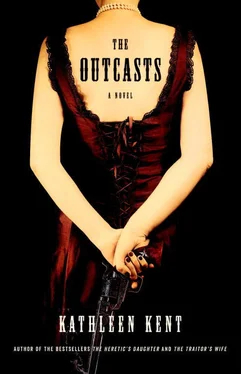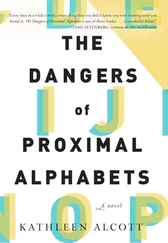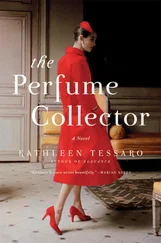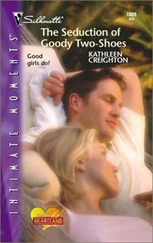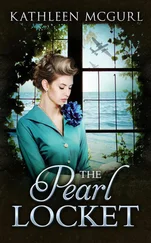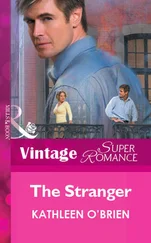Lucinda put a hand to one cheek, felt the tacky, saltwater air from the Gulf covering her face like a second skin. She stood on the bottom deck and, closing her eyes against the glare off the water, leaned against one wall of the barge’s passenger cabin. Above her, on the hurricane deck, the men walked about, smoking and laughing good-naturedly about the fine weather, expressing hopes or giving assurances that the passage would prove calm.
From within the passenger cabin, she could hear some women talking, enjoying an effortless voyage where they could sit at their ease. It would be cooler inside, away from the press of the sun, but Lucinda had no desire to talk mindlessly for hours about children, husbands, relatives soon to be found or lost, tatting, quilting; the disasters of small days, the tragedies of long nights.
She had waited for three days at the Lamplighter before her suitor had come. By the evening of the second day, she had been close to panic, pacing her room, parting the curtains to watch the streets for him. He was a cautious man, but he had always been punctual in his habits with her, and a vision of his possible injury or death sent her searching for the laudanum bottle to ease her into sleep.
On the third day, she sat for hours in a chair, certain he had abandoned her, and now her troubled visions were of herself alone, sick and discarded. She stared at the laudanum bottle, still half full, and considered drinking it all. She returned to her bed and lay, unmoving and cold, trying to recall his touch, or any touch in her brief life that had not been prompted by anger or empty, ungratifying lust.
He slipped into her room on the evening of the third day, well past dark, making his way soundlessly to the bed after she had already fallen into a drugged sleep. She woke as he was easing himself naked under the quilts next to her. He clamped his hand over her mouth, his quiet laugh in her ear, and he whispered, “You didn’t wait up for me.”
He raked up her nightdress with his other hand and then covered her eyes as well as her mouth but made no moves to have her until she had molded her body willfully against his. This initial withholding on his part—the momentary passivity so contrary to his restless animal strength—always excited her. It gave her a fleeting sense of control, a temporary feeling of safety, which was replaced by the even greater excitement of his forceful lovemaking.
Afterwards, they lay for a while, not speaking. She turned her back to him so that he wouldn’t see her tears of relief and biting anger. “You left me alone here for days,” she said. “With no word of where you were, or when you were coming.”
He traced a fingernail against one shoulder blade. “The vagaries of surveying, my dear. You must be patient.” He yawned as though he were falling asleep, but then he asked, “You’ve secured your position at Middle Bayou?”
“Yes,” she answered. “I’ve written that I’ll be arriving in two weeks’ time.”
“Good.”
She turned to face him. He was motionless, but she could see the partially opened lids, the eyes watchful. “You’ll come soon for me?”
He smiled and said, “You look flushed. Is it another fit coming on?”
She frowned and flopped away from him again, lying on her side. He pressed himself against her back, palming one breast. “Lucy,” he said, the nickname that was his alone to use. “You know I’ll never leave you. I’ll never abandon you, but you shouldn’t question me. Do your job. Write to me of your progress, and, when the time is right, I’ll come for you.” He expelled air into her ear mirthfully. “Then, when I introduce you to my mother, I can truthfully say that my wife has been a teacher, not a whore.”
“I thought you liked the whore.”
She could feel his lips curling against her shoulder. “Oh, make no mistake. I like the whore just fine. One might even say I like the whore better than anything.” He rose up on one elbow, looking down at her. “The whore neither spins nor sews, but neither is she idle. She is not deceitful in her chosen enterprise; she is not puffed up. She is what she seems to be. Purely the embodiment of both commerce and discourse, pressed and distilled to a place no bigger than a sparrow’s nest.” He stroked her hair and slipped his fingers between her thighs. “Why, the only difference between you and our family deacon is the fob watch…”
Now, a movement next to her as she stood on the barge pulled her thoughts back to the river, and she saw a man standing close by in a startling orange-and-brown-plaid suit, the tight-fitting coat long to his knees. He removed his hat, nodding to her awkwardly, his hair nearly as orange as his jacket. She suppressed a smile, imagining his tailor convincing the man that the mirroring colors of the cloth were complimentary to his person as well as fashionable.
He pointed to the riverbank and said, “It’s beautiful, isn’t it?”
She followed his gaze and saw a large persimmon tree, the ripened fruit like scarlet globes of Italian wedding glass, perfect and seemingly untouched by birds.
“Yes,” she said. “It’s beautiful.” She looked at his white, spotted profile and pale hands and realized he was closer to a boy than a man. “I’ve only ever tasted one, and it was near heaven.”
He looked at her for a moment and then began to unbutton and remove his coat. “Shall I swim over and get you one?”
She laughed, shaking her head no, but to her amazement, he smiled more broadly and began to remove his stiff collar and shirt as well. He drew laughs and shouts from the men above, which brought the women out of the cabin, looking to see what the excitement was about. Lucinda held her hands over her mouth in disbelief that he could be so foolish—perhaps he truly was a lunatic.
He began pulling off his boots with some difficulty, and she then realized that he had been drinking, most likely fed whiskey by one of the other men. The women squealed in protest, and, while the men shouted encouragement, Lucinda fell helpless with laughter watching the boy stripping down to his undergarments and preparing to crawl over the railing.
The captain shouted a warning at them from the steering house and climbed down the ladder holding a rifle. He grabbed a handful of the boy’s undershirt and quickly hauled him back off the rail and onto the deck. The captain whistled shrilly, and his dog, a black spaniel, leaped into the water and began swimming towards the shore.
The captain turned to the boy and said, “Watch and learn.”
The dog had not swum ten yards before the water under the reeds started to boil, and the logs that had rested against the bank, bobbing gently with the current, began to move purposefully toward the center of the river. The captain whistled again and the dog turned and began paddling back to the barge.
The once-featureless logs resolved themselves into leviathans with churning legs and tails, three of them swimming rapidly to where the dog, his narrow-snouted head showing above the glassy surface of the river, was treading water in a way that seemed to Lucinda too languid for safety.
The passengers, men and women, came to stand at the railing to watch the dog’s progress, the near-naked boy forgotten. The alligators had closed the gap between themselves and the dog by a good twenty feet when the captain took aim with his rifle and fired. The bullet struck the first gator in the broad space between the eyes. The impact of the bullet on the skull made a sound like a mallet against a watermelon, and the creature sank without a struggle.
The ship’s fireman, his face and arms blackened from stoking the engine’s furnace, joined the group, and he swung open the boarding gate and hunkered down, readying himself to pull up the dog once he breasted the hull.
Читать дальше
